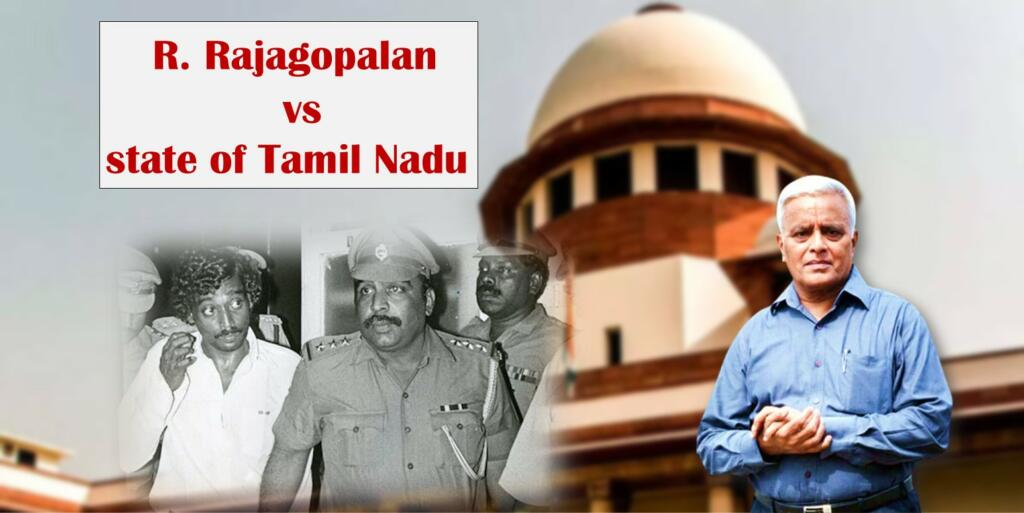Rajagopalan vs state of Tamil Nadu case: In a democratic society, fear is the only way to control the population. Through fear-mongering, people in power throw you in a state of anxiety and push you towards accepting their demands. It doesn’t always work though. Especially when an independent Judiciary is present. It closes the lid on their fear-mongering.
Freedom of expression V. right to privacy
In 1990s, an auto driver committed six murders. Accordingly, he was given the death sentence. When he was in prison, he is said to have written an autobiography and ultimately gave it to his advocate for publishing. A magazine named ‘Nakheeran’ dared to publish it in parts. However, after 3 partial publications, the administration tried to stop its publication.
When the matter reached the Supreme Court, it had to decide on some crucial issues. Number one, whether one citizen can stop another one from publishing anything. Another question was whether the government could curb the publication for fear of defamation of officials. Third question was whether those public officials could pass a restraint order.
In essence, Rajagopalan vs state of Tamil Nadu case was a fight between freedom of expression and the right to privacy. The Apex Court decided the case with the same lens as well. It differentiated between normal right to privacy and its elevation as a Constitutionally guaranteed right. In India, Right to Privacy is a derivation from Article 21, which protects a person’s life and liberty. The Apex Court held that the right is Constitutional, but not absolute.
Right to privacy
It traced back the development of Right to Privacy in the US and the UK, two places where English Common law is prevalent. In Grisworld Case, American Court had identified that Privacy rights are older than even Constitution, political parties and school system. A right so fundamental in nature could not be taken back by new establishments. In the infamous Roe V. Wade case, the US Supreme Court had held the killing of her own unborn child as protected right under right to privacy.
The Court also checked into the Kharak Singh and Gobind case to establish that surveillance by authorities is subject to the checkpoint of fundamental rights.
Citing these cases, the Apex Court held that Privacy of an individual can be denied only when a superior interest is served by snatching it.
Also read: Free Speech Case: We have some questions for the Indian judiciary
Citizens and Public officials are different
Then the Court went on to differentiate between Privacy rights afforded to citizens and public officials. According to the Apex Court, Public officials play important roles in society. They shape views of society and in the final extrapolation influence policy as well. Logically, if the right to privacy is available to them like an average citizen, then there is risk of abuse of power, which could ultimately lead to curbing freedom of expression.
Presumably, to stop this misuse, the Apex Court held that they can’t claim action for damage from a publisher in accordance with their right to privacy. This is because they are acting as a public official with explicit responsibilities towards the general populace. Court went on to state that even when some false information is published in their name, public officials can’t sue them generally. Their cases are sustainable only when they can establish that the publisher of information acted with malicious intent against them.
To reach to these conclusions, Apex Court relied on Time Inc. v. Hil, Derbyshire County Council v. Times Newspapers and Leonard Hector v. Attorney General of Antigua and Barbuda cases.
Fear-mongering did not work
The final issue was to see whether the state had any right to pass a restraint order. The Apex Court referred to the New York Times v. United States, also known as Pentagon Paper case and established that any such order is prima facie unconstitutional. It was for governments to show that the order was not unconstitutional.
In this case, the whole state machinery failed to prove that prohibiting Auto Shankar from publishing the book is Constitutional. Consequently, Shankar’s book was allowed to be published.
They say government is a necessary evil. Necessary is for the privileged class while evil is the keyword for average citizens. Rajagopalan vs state of Tamil Nadu was the classic case of the manifestation of that evilness. Luckily honourable SC came to the rescue of fundamental rights.
Support TFI:
Support us to strengthen the ‘Right’ ideology of cultural nationalism by purchasing the best quality garments from TFI-STORE.COM
Also Watch:
https://www.youtube.com/watch?v=CWIZQWZjmoI
